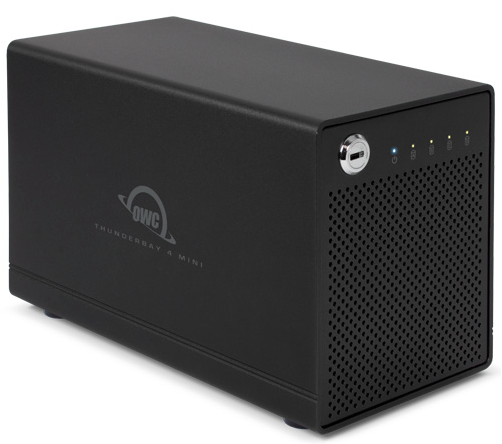GRAPH LEGEND
SSD raid 0 = OWC ThunderBay 4 mini with four 1TB Mercury Electra 6G SSDs in RAID 0 set
SSD raid 5 = OWC ThunderBay 4 mini with four 1TB Mercury Electra 6G SSDs in RAID 5 set
SSD raid 1+0 = OWC ThunderBay 4 mini with four 1TB Mercury Electra 6G SSDs in RAID 1+0 set
HDD raid 0 = OWC ThunderBay 4 mini with four 1TB Travelstar 7K1000 HDDs in RAID 0 set
HDD raid 5 = OWC ThunderBay 4 mini with four 1TB Travelstar 7K1000 HDDs in RAID 5 set
HDD raid 1+0 = OWC ThunderBay 4 mini with four 1TB Travelstar 7K1000 HDDs in RAID 1+0 set
SoftRAID version 5 was used to configure the RAID sets. Test mule was a 'late 2013' Mac Pro 8-core.
RED graph bar means the fastest overall in Megabytes per Second.
LARGE SEQUENTIAL TRANSFER TEST
We used AJA System Test to test file level sequential transfer speed using a 16GB test document.
INSIGHTS
The ThunderBay 4 mini fills a slot missing in the Thunderbolt 2.0 storage sphere. Though some Thunderbolt RAID boxes offer adapters for 2.5" drives, the ThunderBay 4 mini is designed exclusively for 2.5" drives. You no longer need to tolerate a big box with noisy fan just to have a fast Thunderbolt RAID solution. Its small footprint measures 7.5 x 3.5 x 4.25 inches. With four SSDs, it weighs only 3 pounds.
We featured the Mercury Electra 6Gbps SSDs in the graphs above to drive home the narrative that you can have both speed and capacity. With four 1TB Electras in a RAID 0 set, you have a 4TB volume.
With four 2TB notebook HDDs, you attain 8TB total volume. However, with HDDs like the Hitachi Travelstars we used, your large sequential transfer speeds are not nearly as fast as the SSDs. And your small random transfers will be much slower.
Unlike some storage makers, OWC lets you buy the ThunderBay 4 mini either populated with drives or empty.

Feedback or comments? Feel free to email me,
Also, you can follow me on Twitter @barefeats